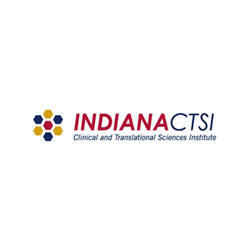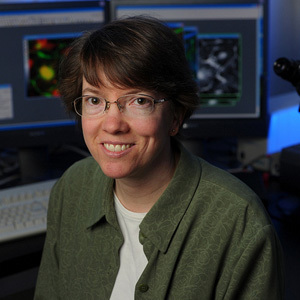

Holly Goodson
Three College of Science faculty are among the 23 recipients of Spring Core Pilot Grants from the Indiana Clinical and Translational Sciences Institute (CTSI). The Core Pilot Grant program provides small pilot grants to access labs and technology whose resources can help kick-start promising basic research projects with high potential to go on to attract additional dollars from outside funding sources, such as the National Institutes of Health and public foundations. The program provides all grant recipients access to more than 60 core facilities across the Indiana CTSI member institutions of Indiana University (IU), Purdue University and the University of Notre Dame.
Holly Goodson, professor of chemistry and biochemistry, received $10,000 to access the Genomics and Bioinformatics Core at Notre Dame in support of the project "Development of an improved chemical mutagenicity test based on a yeast continuous culture system." Given the large number of chemicals in the environment, food, and water, it is important to develop inexpensive and effective tests that can determine the potential harm of these compounds. The goal of this project is to develop a quantitative test to measure mutagenicity using the whole sequenced genome of yeast grown in continuous culture systems as the foundation of the test. This new test is designed to provide improved analysis of the long-term safety of complex mixtures of compounds at low levels, such as those found in reclaimed water.

Kasturi Haldar
Kasturi Haldar, the Rev. Julius Nieuwland, C.S.C., Professor of Biological Sciences and James C. Parsons and Carrie Ann Quinn Director of the Center for Rare and Neglected Diseases, received $9,176 to access the Purdue Translational Pharmacology Core at Purdue University in support of the project "Combination Therapy for Niemann-Pick Type C." Niemann-Pick Type C (NPC) is a rare, neurological disorder that causes cholesterol to accumulate in the body’s cells, especially the brain, leading to fatal neurological problems. There is currently no FDA-approved treatment for NPC. Haldar’s lab is currently testing a potential treatment using a three-way combination shown to be highly effective in NPC mice. The potential treatment is composed of cyclodextrin, a compound used for cholesterol chelation and drug delivery, vorinostat, a histone deacetylasce (HDAC) inhibitor, and polyethylene glycol, which is active in a broad range of neurological disorders. This grant will be used to generate data for an Investigational New Drug (IND) application to conduct clinical trials.

Siyuan Zhang
Siyuan Zhang, the Nancy Dee Assistant Professor of Cancer Research in the Department of Biological Sciences and the Harper Cancer Research Institute, received $9,600 to access the Imaging and Flow Cytometry Facility at the Indiana University School of Medicine in support of the project "Spatial and Temporal Molecular Phenotyping of Early Metastatic Colonization In Situ." Zhang’s project focuses on better understanding metastasis, specifically in brain metastasis, using a variety of 3-D intravital and multiphoton imaging approaches. His project hypothesizes that reactive astrocytes facilitate brain metastasis colonization through dynamic interactions with disseminated tumor cells.
"We're proud to support such a wide range of innovative research happening across our member institutions," said Anantha Shekhar, M.D., Ph.D., director of the Indiana CTSI and associate vice president of clinical affairs at IU. "Each project was carefully selected for its high potential to one day translate into new patient treatments and therapies. Based on our proven history of success in this process, we're confident they will go on to yield significant returns on investment in the coming months and years.”
The Indiana Clinical and Translational Sciences Institute, directed by Anantha Shekhar, M.D., Ph.D., is a statewide collaboration of Indiana University, Purdue University and the University of Notre Dame along with many public and private corporate partnerships to facilitate the translation of scientific discoveries in the lab into new patient treatments in Indiana and beyond. For more information, visit www.indianactsi.org.